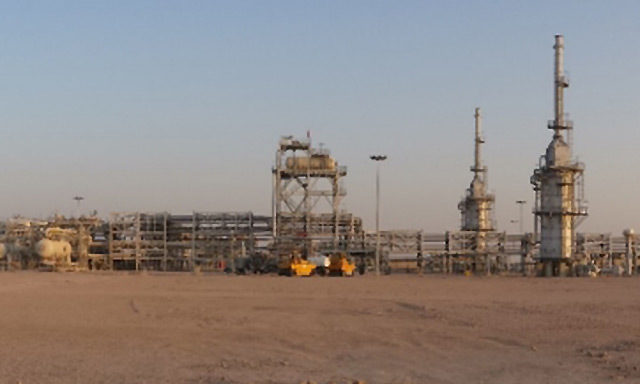
Energy companies surged on the highest crude prices in eight months as violence in Iraq spurred supply concerns. The yen dropped with India’s rupee while the UK pound strengthened a second day and metals rose.
A measure of oil and gas firms in the Stoxx Europe 600 Index jumped 0.7% by 8.15am with a similar gauge in Asia advancing 0.9%. Standard & Poor’s 500 Index futures added 0.1%. West Texas Intermediate oil rose 0.9% and Brent added 0.9%. India’s rupee fell to a one-month low and the yen dropped 0.3%. The pound climbed 0.3 percent while copper rose 0.7%. Five-year US Treasury yields climbed three basis points.
Escalating violence in Iraq is raising the prospect of further disruptions in OPEC’s second-biggest oil producer. The yen dropped from the strongest this month as the Bank of Japan kept record stimulus unchanged, a move predicted by all 33 economists in a recent survey. Growth in China’s retail sales, industrial production and fixed-asset investment came in as estimated today, after the country reported new loans that beat forecasts.
“The Iraq situation has the potential to become more significant, so people are naturally concerned,” said Angus Gluskie, a fund manager who helps oversee more than $550million at White Funds Management in Sydney. Any pullback will be limited because “the underlying factors that have driven the market higher haven’t really changed. They’re still reasonably strong.”
Energy, resources and utility stocks were the only three groups of 19 industries on the Stoxx 600 to advance today. The European gauge is little changed for the week after eight straight weekly advances.
Iraqi forces sought to check the rapid advance of Islamist militants who had seized major cities, as Prime Minister Nouri al-Maliki responded to the greatest threat to his government since taking power. The Shiite-led government is struggling to retain control of Sunni-majority regions, and al-Maliki’s army units in northern Iraq collapsed in the face of the Islamist advance.
WTI traded at $107.31 a barrel, the highest level since Sept. 19. Brent cost $113.91, the most since Sept. 9.
Total SA added 0.7% and Royal Dutch Shell Plc climbed 0.6$, with both companies extending yesterday’s gains. CNOOC Ltd., China’s biggest oil refiner, jumped 2.1% and was the top support for the Hang Seng Index, which added 0.7%. PetroChina Co., the country’s number one producer, advanced 0.9% in Hong Kong.
Inpex Corp., Japan’s largest energy explorer, surged 4.5% in Tokyo, the most on the Asia-Pacific gauge, and South Korea’s SK Innovation Co. added 3.5%.
“There’s potential for disruption to spread around the Middle East and we’re talking about significant amounts of daily supply,” Michael McCarthy, a chief strategist at CMC Markets in Sydney who predicts Brent may climb to $125 a barrel if there’s an attack on Baghdad. “The market got concerned about potential disruption in Libya; Iraq is a much more serious situation.”
President Barack Obama said he won’t rule out using airstrikes to assist Iraq’s government. Iraq “clearly is an emergency situation” and the government there needs more help, Obama said.
India’s rupee weakened 0.4 % to 59.4637 to the greenback, the lowest since May 15, as investors bet soaring oil prices will add to the country’s balance-of-payments woes. India is the world’s fourth-largest consumer of oil. The US, China and Japan are the top-three users of the fuel.
The yen slid to 101.95 per dollar, heading for a 0.5% gain since June 6. The BOJ, led by Governor Haruhiko Kuroda, has kept its policy since April 2013 in stimulus that tends to weaken the currency. Nine percent of economists surveyed from June 3 to 6 predicted extra monetary stimulus in July, down from 38% in the previous survey.
“The BOJ is likely to remain inactive for the next several months,” said Maiko Noguchi, senior economist at Daiwa Securities Co. in Tokyo and a former central bank official. “Inflation will start to diverge from its outlook without a boost from a weaker yen, and the central bank will have to respond later this year.”
China’s yuan climbed 0.2% in onshore trade today to 6.2065 per dollar. It earlier climbed to 6.2056, taking its weekly advance to 0.7 percent, the most since August 2011.
The UK pound climbed to $1.6973, extending yesterday’s 0.8 percent advance. Bank of England Governor Mark Carney said the central bank may raise interest rates from a record low earlier than investors expect and expressed concern that mounting debt related to the housing market could undermine stability.
Recommended for you
